
The Free Press

For most people here in L.A., weekends are for spending time with family, taking a long hike or walking the beach, maybe barbecuing. But for those of us formerly known as indoor kids, weekends are for binging podcasts.
If that sounds like your jam, I invite you to take a listen to the two most recent episodes of Honestly.
First up: a conversation about why men seek danger—and perhaps even need war—with the award-winning journalist and documentary filmmaker Sebastian Junger.
Junger was a war correspondent for many decades. His reporting on the front lines of Afghanistan was captured in his best-selling book, War, and was made into an Academy Award-winning documentary, Restrepo, which follows a platoon of U.S. soldiers in one of the bleakest, most dangerous outposts in Afghanistan. His on-the-ground reporting is raw and unfiltered, and perhaps no one else has done more to illuminate the full picture and reality of war.
We discussed why war gives meaning to men; the unexamined costs of our abundance; living in comfort and safety; and a recent near-death experience that changed his life. I try not to pick favorites, but this conversation is up there for me:
I love podding with Tyler Cowen. Who else can seamlessly slip from conversation about inflation to his favorite Romanian novel and onto the best Korean film of the past year? This week, Tyler sat down with me to talk about the state of the economy. Specifically: the collapse of Silicon Valley Bank; the psychology of bank runs, recession anxiety; persistent inflation; the state of the tech industry; the seduction of crypto; the potential salvation of AI; and more. Listen here:
Below, you’ll find edited excerpts from my conversations with Tyler and Sebastian.
Last thing: if you love our podcasts, please become a paid subscriber to The Free Press today. It helps us keep the lights on, and allows us to bring you the best conversations with the most interesting people on the most pressing stories of the day.
Have a wonderful weekend—and happy listening. — BW
On why danger is a central theme of his work:
BW: Danger is one of the major themes that runs through all of your work, whether it’s the physical risk that comes with doing dangerous jobs or the risk that comes with living in dangerous parts of the world, or most obviously, the danger of war. I wonder if you can explain what draws you to that subject. Why have you chosen to dedicate much of your work to understanding why human beings, and particularly men, seek and maybe even need danger?
SJ: I think I sought out situations that were dangerous because I grew up in a very affluent, safe American suburb, and as a human being and as a man—and those are two different things—I felt like I had never really sort of grown up. I never really tested myself, proven myself to my society. And that’s a crucial step for both men and women, to show your society that you’re worthy. And of course, we’re social primates. Humans die alone in nature almost immediately. We survive because we’re part of a group. And being part of a group requires participation. You have to be worthy of it and you have to make sacrifices for it or they don’t want you. And that’s always been true. And if you grew up in an affluent American suburb, it’s hard to tell if you’re fulfilling those standards or not. So I think that’s what drove me journalistically. Situations that are in flux, that are dangerous, that are mortal, that are deadly, are situations of high consequence for the world, for history, for the future. And so as a journalist, those situations drew me as well.
BW: I imagine that a lot of the men that grew up in your affluent suburb never sought those experiences out. They went on to their job at McKinsey or JPMorgan or the law firm. What made you break away from that, and what was the first dangerous thing that you sought out personally?
SJ: The first dangerous thing I did, trying to just make some cash to live on, I started working as a climber for three companies, so I was on a climbing line 50, 8,000 feet in the air with a running chainsaw, taking trees down in pieces. And it’s very dangerous work, if you make a mistake. If you don’t make a mistake, it’s not dangerous. It’s less dangerous than a ladder. And I realized that all the things that would get me killed up there were knowable. It was just the laws of physics. And if I got killed up there, it was because I’d messed up. The fact that my existence was entirely my responsibility and depended on my good actions was intoxicating. It allowed me to deal with my fears. And eventually after that, I went off to Bosnia in a desperate attempt to learn the craft of journalism and war reporting during the Bosnian civil war in the siege of Sarajevo in 1993, which was long before the U.S. got there as a peacekeeping force.
On his new book, ‘Freedom’:
BW: It’s a perfect transition to talk about your new book, Freedom. You talk about finding those situations where there’s risk and valor are not really legal and not really available, but you construct one for yourself in this book. It’s a throwback to a time where people used to hitchhike and sleep rough and jump trains. America today is so profoundly safe. It’s so coddled, broadly speaking, that you have to go out of your way to artificially create a sense of danger and live on the edge. The book is a chronicle of a journey that you and a small group of acquaintances, all men, have as you walk 400 miles along railroad lines over several months from D.C. to my hometown of Pittsburgh. Why did you decide to embark on this strange pilgrimage? What were you looking to get out of it?
SJ: I went on this journey long before I knew I would write a book called Freedom. But as I was writing the book, I asked myself, What’s the freest you’ve ever been? It’s a tricky question. If you work hard and make a lot of money, you have economic freedom, which is a very, very important form of freedom. If you aren’t working hard and most of your hours are your own, you have temporal freedom. There’s all kinds of different forms of freedom. What I realized is that on this trip, you know, we were sleeping. We called it high-speed vagrancy. We were walking along the railroad lines, totally illegal. The cops were looking for us. At one point they were looking for us with a helicopter and they couldn’t find us. I was with two guys who were former soldiers and another guy, a journalist, who had held my best friend’s hand as he died, as he bled out on the front lines in Misrata, Libya, during the civil war in 2011. So I took these three guys and we walked along the railroad lines, which are these swaths, these narrow strips of no man’s land that crisscross America. We were sleeping under bridges and in abandoned buildings and getting our water out of creeks and cooking over fires. We were walking through ghettos, through farms, through suburbs, through everything America from the inside out. And I realized that most nights, we were the only people who knew where we were. We carried everything we needed on our backs. We bought food once in a while and we were highly mobile and autonomous. And no one knew where we were. And that’s a profound form of freedom. So I decided to write about this trip, along with the historical inquiries, the scientific inquiries into why is it that humans can defeat larger adversaries. We’re the only species that can do that, the only one. And it’s what gives us freedom. The two are maybe uneasy companions, but they do illuminate each other quite well, I think, in my book.
On the meaning that men find in war:
BW: When we talk about war, we’re talking about an almost entirely masculine experience. Nine in ten veterans are men. Everyone in that valley was a man, and a young man. Why do men uniquely find value and meaning in war?
SJ: How could they not? It’s the high stakes. The stakes are life and death. You have to put the lives of others ahead of your own life, and you are living completely in the moment. All of those things are what religion aspires to impart to people, and usually fails. A war delivers. For a 19-year-old who has very low status in society, the profound meaning that comes from being in a life and death situation where other people are counting on you is completely life-altering. For hundreds of thousands of years, encountering risk either in hunting or in warfare were how young men protected their community and demonstrated their worthiness of being accepted into the group of elders, to being married, to having children. Everything was demonstrated through courage and hardship. There’s a phrase in English: be a man about it. It sounds sexist. I think it’s actually the opposite. I think what the phrase is saying is it’s very possible to be an adult male and not a man. Not mature. No one says be a woman about it, because I think society understands that it’s because the stakes of pregnancy are so high for women that it’s much harder to be an adult female and immature. The consequences of your life for a woman can be sudden and very serious. Men have to sort of choose to do that. This is in historical terms, right? So society needs men. Men can fake their bravery until called upon. And I think that’s why young men want to be tested, because they want their peers to know that they’re worthy.
About the personal experiences that changed his life:
BW: You’ve had two monumental life events in the past few years: a near-death experience, and becoming a father later in life. So let’s start with the first thing. Most people run away from danger and death, but you have run toward it, maybe even chased it. And though you’ve covered front lines in war zones for much of your career, your own brush with death came not in the trenches, but in your own driveway. You referenced it earlier in the conversation, but I wonder if you could tell me about what happened that day. And you mentioned the experience of your father hovering over you. Tell us a little bit more about what happened.
SJ: Three years ago I gave up war reporting. I gave up risk-taking. I had these two amazing little girls, my two daughters, in my mid-fifties. I finally settled into profound emotional freedom. The point of my life is to protect and nurture and love these two little children. And I might not have felt that way if I’d gotten someone pregnant when I was 23. I matter because I’m there for them. That’s one of the advantages of becoming a parent later in life. Then, almost three years ago, I’d had sort of intermittent pain in my abdomen, which I sort of ignored, and all of a sudden, literally mid-sentence, I felt this bolt of pain go through my abdomen. I didn’t know what it was. I stood up and said, “Wow, something’s really wrong.” I didn’t know it, but I had an undiagnosed aneurysm in my pancreatic artery and it had ruptured at that moment. I was bleeding out into my own abdomen and I lost probably about 50 percent of my blood, which is right at the limit of what they can bring you back from. Beyond that, even if you get to the hospital, it’s hopeless, and it took 90 minutes to get me to the hospital. I didn’t know I was dying. I was in and out of consciousness. We got to the hospital and the doctor asked permission to cut my neck open and put a line into my jugular vein to give me enough blood to keep me alive. And as he was working on my neck, this black pit opened up underneath me. I started getting pulled into it and I didn’t know I was dying, but I knew that if I went into that pit, I was never coming back. I didn’t want to go. I started panicking. Right at that moment, my dead father appeared above me. He said his arms were open. He said, “It’s okay. You don’t need to be scared. You can come with me. I’ll take care of you.” And I was like, “Come with you? You’re dead. I’m not going with you. What are you talking about?” I said to the doctor, “You got to hurry. You’re losing me right now. I’m going.” They barely got me back. It took hours under a fluoroscope trying to find it and embolize the ruptured artery. I was under the fluoroscope for so long, I got radiation burns on my back. I got this little square red patch on my back. I called it Squarenobyl to my wife. She didn’t find it that funny. But I survived. As an atheist, anti-mystic, the whole experience was quite confusing.
BW: Would you describe what happened that day as a spiritual awakening?
SJ: I’ll end with this. The level of trauma from what happened to me, because it was supposed to be a place of safety, my home, because it was unexpected, because I have two little girls now—the level of trauma was off the chart. Way worse than combat. It took me a long time to recover. I’m still recovering from it.
TYLER COWEN:
On Silicon Valley Bank:
BW: Things seem especially unstable right now. And that’s because two weeks ago, Silicon Valley Bank, which was the sixteenth-largest bank in the United States and the bank of choice for many tech start-ups, collapsed in what was the second largest bank failure in U.S. history and the biggest collapse since Lehman Brothers in 2008. What happened to Silicon Valley Bank?
TC: There are a number of ways of looking at the story. First, the bank was very poorly managed. Second, they had a very large percentage—by some estimates, over 95 percent—of deposits not insured by the FDIC. Third, so many of the depositors were tech people, start-up people, venture capitalists, which is a fairly tightly interconnected network. So it’s much easier to imagine them sending around a bunch of WhatsApp messages and having a pretty rapid run on that bank compared to, say, a community bank in the Midwest where deposits are much stickier. So you put together all of those features of the problem and what happened was people started to panic. Word got around. There was a run on the bank and in essence, on the FDIC, the Fed, and the Treasury. More or less, this consolidated entity had to step in and essentially guarantee those deposits. Now, that’s a mess. But we’re not actually in the midst of a financial crisis right now the way we were in 2008. So I don’t want to call it good news, but so far at least, the problems appear to be relatively contained.
BW: Depending on who you ask, you get a very different answer about the primary factors behind the bank run. You get answers ranging from SVB was too woke, to it had poor risk management, and everything in between. Many people say a big part of the blame for this lies at the feet of the Fed for being too late to acknowledge inflation and for driving up interest rates over the last year. How much of what we just witnessed was the result of these two decisions on the part of the Fed?
TC: The Fed was too late recognizing the dangers of inflation. That is true. But some people are also trying to argue that they raised interest rates too fast. If the Fed had raised interest rates more slowly, inflationary expectations might have become more entrenched to choke off the inflation. They would have had to raise rates all the more. Maybe they would have done it more slowly, but keep in mind, SVB, for almost a year, didn’t even have a chief risk officer. It’s naive to think they would have cleaned up the mess and put everything in order by giving them another six months. Once the Fed realized that it made a mistake, it probably was doing the right thing to raise rates more quickly than not. If you have to do it, rip off the Band-Aid. It’s going to hurt, but waiting, very often, hurts more.
BW: Others say that one of the biggest factors in the bank’s demise was a handful of influential venture capitalists who started the panic, telling the founders in their portfolio companies to pull out of SVB. And this was instigated by a newsletter that you mentioned before that was written in January, and then later a Twitter thread that was very influential. Do you buy that?
TC: It does seem that SVB was not able to redeem deposits. Are we going to blame the messenger? Obviously, if we had all gone to sleep like Rip Van Winkle and waited ten years, and the Treasury securities paid off, the bank would have been fine. But I would not blame the messenger. The problems in that bank were real at multiple levels, including the management’s inability to heed regulators. The regulators were asleep. So, no, I don’t blame the people who spread the word.
On neuroticism and abundance:
BW: In the wake of SVB collapse, many on the right and the left seemed to be singing from the same hymnal, and the song is very simple: screw these people. Not only should there not be a bailout of the bank, which was the consensus opinion, but the depositors who trusted the bank shouldn’t even be made whole. On the left, the sentiment was that venture capitalists are reckless, greedy, wealthy parasites; they’re tech bros. On the right, it was much of the same thing, but with “coastal woke elites” added in. Both sides seem to ignore the fact that thousands of people affected by this bank’s collapse were neither wealthy VCs nor coastal elites. On the contrary, they were small business owners or founders of very small start-ups. How do you understand this strange political realignment? What is it about tech and Silicon Valley that hits a nerve with so many Americans?
TC: America as a country right now is pretty high in neuroticism. Silicon Valley has been pretty successful. It’s changed all our lives. We spend a lot of time with Silicon Valley–derived devices, so of course it becomes an enemy. It’s the ritual sacrifice of American intellectual life. But I think, had we not done anything, there would have been runs on many more banks that would have been disastrous for much of the country. But again, we had a pretty simple remedy. Those major bailouts weren’t necessary. All we had to do was let someone come in and buy the thing. And that’s what we didn’t do. That's what I see as the huge mistake.
BW: So you see Silicon Valley as the scapegoat for our abundance.
TC: Also the scapegoat for a lot of the problems in our politics. I typically blame the voters. So you hear, oh, Silicon Valley got this candidate elected, that candidate elected. And the story changes depending what side you’re on. Ultimately, the voters decide. The voters do not always choose well. Silicon Valley is a kind of conveyor belt. You can say it magnifies some ideas. But when you look at what actually decides elections, typically it’s fundamentals and whether they’re good candidates and what they say in their campaigns and how they did when they were in office.
On what SVB’s collapse means for the future:
BW: What are the lasting repercussions of SVB’s collapse?
TC: In part, the collapse of SVB was brought on by higher interest rates. So the Fed, and indeed other central banks around the world, they’re now more reluctant to raise interest rates at the pace they had planned. So they are likely to keep interest rates lower for longer periods of time. That will increase inflationary pressures. So it will be harder for many economies to get rid of their especially high inflation rates. That’s the main upshot right now. And that’s bad, of course.
BW: Do you think that as SVB’s collapse makes it more likely that we’re going to head into a recession faster and sooner?
TC: I think the SVB collapse and the resulting decision to probably keep rates lower will postpone any recession. But it will mean that if a recession does come, that recession will be worse because we postponed it for longer.
On cryptocurrency:
BW: A lot of people are saying that the collapse of SVB is one heck of a good case for decentralized banking. “Don’t trust banks, trust Bitcoin.” Do you think that’s a reasonable takeaway from what’s happened? Is that a good lesson to draw?
TC: The prices of crypto have been extremely volatile. I don’t intend that as a criticism, but it doesn’t mean that you should put your trust there, right? Crypto is a way to make or lose a lot of money very quickly. I view it as kind of a luxury product that wealthy people can speculate in. We may build new financial structures out of crypto. That, to me, is an interesting but still unrealized project. But in terms of safety, it’s not a substitute at all. It’s like telling someone, “Oh, your money’s not safe in your bank, go out and bet on the horses.”
BW: So you’re saying it’s less safe and secure?
TC: I would just say Bitcoin was never designed for stability. We’re still unsure what it’s good for. Same with Ether and the Ethereum network. It’s okay that we’re unsure, but as long as we’re insured, those are like venture capital projects where their value changes a lot rapidly. And again, not a criticism, but it just means they’re not safe havens.
BW: Here’s how I think crypto was sold. I don’t think that most people understood it to be the stable bet, but they understood it to be the bet for a place where those who have reasonable distrust in the systems and in the authorities that set monetary policy might turn to for a new sort of hope. A secure place to put hard-earned money where it wasn’t so susceptible to the whims of the Fed or whatever administration was in the White House. But that does not seem to have panned out. It seems like if you look at the past few years, you are better off having left your money to lose value day after day in a savings account. At a time where Americans are understandably looking for a better alternative, did crypto take advantage of our collapsing trust in the system that we currently have?
TC: If you look at the overall data, crypto prices tend to do well when other things are doing well, when interest rates are low, when there’s a lot of stability and when inflation is low. So it’s another financial asset that moves with the market portfolio. Nothing wrong with that, but it’s not some kind of substitute like the canned tuna and the shotgun and the dog where you pull it out when times get rough. It does well on average when times are better.
On effective altruism:
BW: After the implosion of FTX, Sam Bankman-Fried did an interview with the journalist Kelsey Piper, and he seemed to admit to her that his interest in EA was essentially for PR purposes and that the ethics stuff—that’s what he called it—mostly boiled down to “dumb games we woke Westerners play.” What did you make of that?
TC: There’s different ways you can interpret Sam’s words in this context. I view it this way: that being altruistic is itself a form of power. You have the power to actually help people, and if someone gets off on power, they also will get off on altruism. It doesn’t mean their altruism is entirely cynical. They actually enjoy it because they enjoy power. And because they enjoy power, they also enjoy being selfish. So there’s a pretty large class of people somewhat addicted to power who do it in both selfish and altruistic ways. But I don’t think that the altruism is a mere cover for the selfishness. I think, in part, they do in fact want to earn money selfishly so they can give it away. And that’s an ultimate form of power. And possibly that describes Sam as well.
BW: You’ve said that we shouldn’t hold what happened to FTX or SBF against the whole effective altruism movement. Why not?
TC: Every movement will have bad apples, right? The best thing about the effective altruism movement is that it points out how much mainstream philanthropy, speaking of trust, is just wasted, sent to bad places—say parents donating to alma maters that teach their kids things the parents would hate if they heard. On the other hand, effective altruism just says, “Wake up, make your philanthropic decisions rationally.” And that is so long overdue. Whatever else one might say against effective altruism, the main message is, “We can do this better.” I strongly agree with it. I’m fully on board. I don’t agree with all of their remedies. And I think as a class of people, they are far too rationalistic about life and far too likely to think you can sit down and derive all kinds of principles for what you ought to do, and then suddenly, they end up in polyamory, they’re worried that AI is going to destroy the world. It becomes almost religious to them. And I would part company with them on many of those issues.


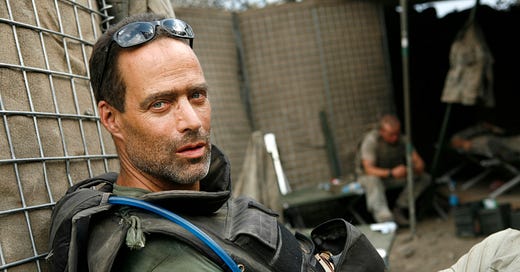





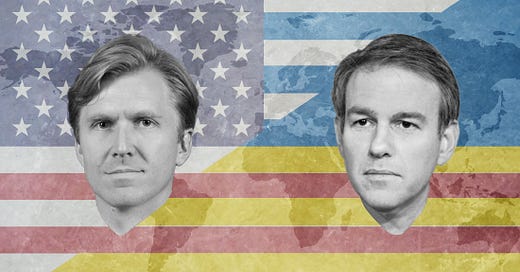
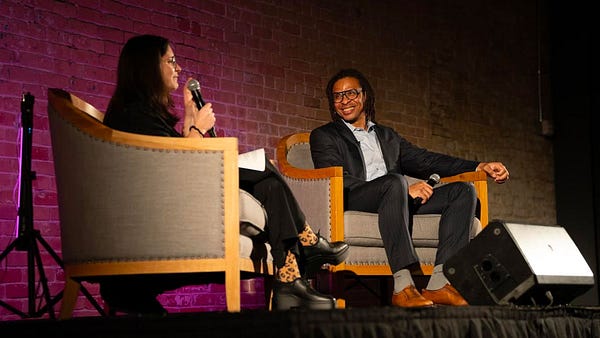

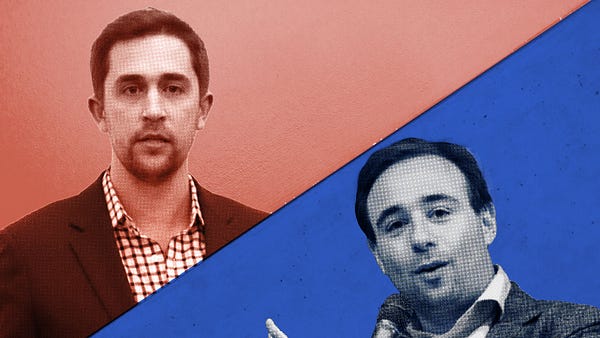

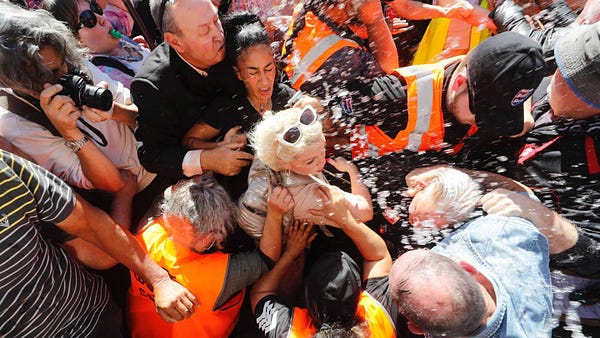

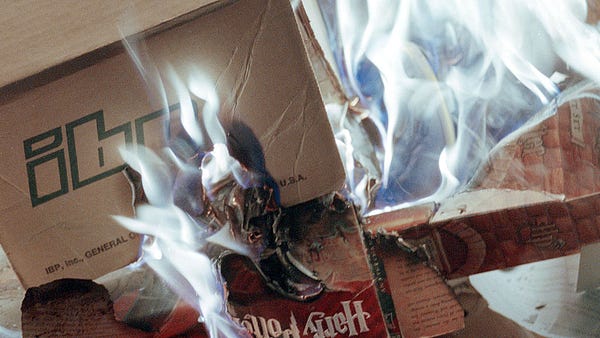

I am a little behind w Baris podcasts. I enjoyed a lot of the Junger conversation BUT Honestly (pun intended) my jaw dropped when he make the ludicrous statement that Republicans were “especially” to blame for weaponizing political division.
The Left controls virtually all of the institutions that form public debate and opinion from the media to the academy to cultural and certainly the government.
He is simply delusional in making that statement and makes me question other things he might say or write about.
As I write this, former CIA agents are admitting what we already know regarding their willingness to support Biden over the laptop. Further no rationale thinking person believes the FBI was not partisan in its pursuit of Trump and connecting him to Russia. Or their lack of interest in pursuing Hillary or Biden for enriching themselves or their families. I guess for Junger that isn’t weaponizing.
The cancellation of people with beliefs that were “mainstream” 10 years ago is uniquely a progressive response. Whatever republicans might do gets magnified beyond anything proportional.
Yes January 6 was terrible. But so were the Antifa and BLM rioters in 2020. For those keeping score, the 2020 riots were multiple times more violent (deaths) and costly than Jan 6. It’s not even close. Look it up. And for those who reflexively say that our democracy is at stake were the same people who invaded the Madison Wisconsin statehouse for several days. These are also the same people who allow falsehoods like “hands up don’t shoot” or “mostly peaceful “ persevere. Also the same who stand silently when the 1619 author says something like “it’s not destruction if it can be fixed w insurance”. Lovely.
Proportion and perspective folks.
I appreciated the points made about mortality rates for soldiers and young mothers. Both men and women have an equally vital and dangerous role to help grow their communities. I have often felt like a 'warrior' for bringing 4 children into the world. Now I will own it and cite my source ;)